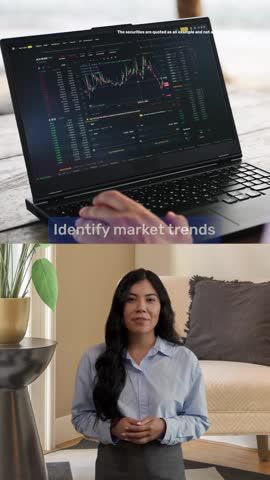To begin delivery trading, the first step is to open a Demat and trading account through any SEBI-registered stockbroker. The process is typically online and requires basic documentation. Start by verifying your mobile number and email, then complete your KYC using DigiLocker or a similar service. Share your personal and bank details and upload supporting documents like a cancelled cheque and income proof if required. Add a nominee if you wish, then e-sign using your Aadhaar-based OTP. Once verified, you will receive login credentials. After funding your account, you can begin investing in shares through delivery trading.
Brokerage calculator – your tool for accurate cost estimates.
Delivery trading example
Meet Ravi, an aspiring investor looking to engage in delivery trading. Ravi believes that XYZ Ltd., a technology company, has strong growth prospects over the next few years. He decides to purchase 100 shares of XYZ Ltd. at the current market price of Rs. 500 per share.
Ravi places an order for 100 shares of XYZ Ltd. The order is executed, and Ravi's Demat account is credited with 100 shares of XYZ Ltd. The settlement date is set for one trading day after the transaction.
Over the next two years, XYZ Ltd. experiences significant growth due to successful product launches and increased demand for its services. The stock price of XYZ Ltd. rises to Rs. 750 per share.
Recognizing the opportunity for profit, Ravi decides to sell his shares of XYZ Ltd. He places a sell order with his broker, and the shares are debited from his Demat account. The settlement process is initiated, and T+1 day later, Ravi receives the funds from the sale in his trading account.
In this example, Ravi engaged in a delivery trade by purchasing and holding shares of XYZ Ltd. for a substantial period. His decision to hold the shares paid off as he benefited from the substantial price appreciation, leading to a profit.
What are the advantages of delivery trading?
- Ownership and control: Delivery trading offers complete control over your shares. You decide when and how much to sell, based on your investment strategy.
- Long-term wealth creation: Holding shares for the long term enables you to benefit from the company’s growth and increasing share value over time.
- Reduced risk exposure: Unlike intraday trading, delivery trading involves less risk since you're not forced to sell on the same day.
- Additional income opportunities: As a shareholder, you’re entitled to dividends and may also benefit from stock bonuses, which can supplement your income while you hold the shares.
Delivery trading charges and minimum margin
The costs associated with delivery trading can differ depending on the stockbroker you use. Below are some of the common charges:
- Brokerage fees: This is charged by your broker either as a flat rate per order or as a percentage of your transaction value.
- Securities Transaction Tax (STT): A government-imposed tax on all stock exchange transactions.
- Exchange transaction charges: Levied by stock exchanges such as NSE or BSE for facilitating trades.
- SEBI turnover fees: A nominal fee of 0.00010% charged by the Securities and Exchange Board of India on the total trade turnover.
- Margin trade funding: If you opt to buy shares using borrowed funds from your broker, you're required to provide a margin amount. The broker funds the remainder and applies an interest rate on the borrowed sum.
Delivery trading rules in the Indian stock market
Delivery trading is subject to certain rules and regulations:
T+1 settlement: In India, the settlement cycle for delivery trading is typically T+1, which means that when you buy shares, you must make the payment within two trading days from the date of purchase.
Demat account: To engage in delivery trading, investors are required to have a Demat account, which can be opened with any broker like Bajaj Financial Securities Limited (BFSL), this account holds the electronic records of their investments.
What are the rules for delivery trading?
Delivery trading involves purchasing shares and holding them beyond a single trading day, often for long-term investment. Once bought, shares are credited to your Demat account within the T+2 settlement cycle—two trading days after the transaction. There’s no obligation to sell within a fixed timeframe, allowing investors to retain shares indefinitely. Unlike intraday trading, there are no margin requirements. However, brokerage fees, taxes, and transaction charges apply. Investors must also ensure sufficient funds are available before placing a buy order. The key advantage of delivery trading lies in ownership rights, including eligibility for dividends and participation in corporate actions.
Difference between delivery trading and intraday trading
The main difference between delivery trading and intraday trading is the time frame in which the trades are executed. Delivery traders buy and hold the shares for a minimum of one day, while intraday traders buy and sell the shares on the same day.
Here is a table that summarises the key differences between delivery trading and intraday trading:
| Feature |
Delivery trading |
Intraday trading |
| Time frame |
Minimum of one day |
Same day |
| Risk |
Potentially Lower risk |
Potentially Higher risk |
| Transaction costs |
Higher transaction costs |
Lower transaction costs |
| Taxation |
Equity delivery gain is a Capital gains income and it is taxed accordingly. |
Intraday trading gains are business profit. |
Conclusion
Delivery trading is a fundamental approach to investing in the stock market, allowing investors to take a long-term view of their holdings. It offers the potential for capital appreciation, dividend income, and reduced pressure to make quick decisions. However, it comes with its own set of risks, including market volatility and potential opportunity costs. Understanding the differences between delivery trading and intraday trading is essential for investors to choose the approach that aligns with their financial goals, risk tolerance, and investment strategy.
Related Articles!





